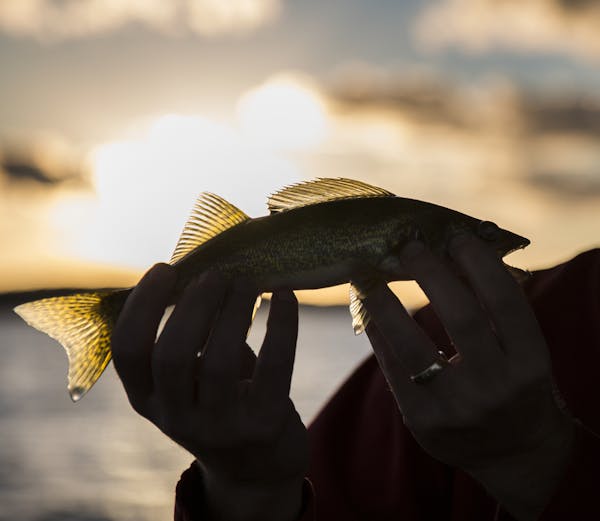By J. Patrick Coolican and Patrick Condon
Gov. Mark Dayton and state lawmakers deadlocked Thursday over his push to provide up to $20 million for Lake Mille Lacs businesses struggling with a premature end to the walleye fishing season, leaving the DFL governor once again unable to marshal political support for a top priority.
A working group of legislators and administration officials tasked with assembling an aid package abruptly adjourned Thursday on an acrimonious note, diminishing the prospects for a special session to bail out a summer walleye season that ended last week because of population decline.
"If they do not want to help Mille Lacs resorters and residents in a special session, they should say so," Dayton, in Mexico on a trade mission, said of legislators in a prepared statement.
Rep. Denny McNamara, R-Hastings, obliged.
"For those that want immediate help in the next month … it's not happening," said McNamara, chairman of the House Environment and Natural Resources Committee.
For Dayton, it's a frustratingly familiar scenario. Now just eight months into his second term, the governor spent much of the regular legislative session watching major priorities and demands go unheeded by the Legislature.
What he frequently called his top two priorities went unfulfilled: money to provide universal prekindergarten classes at public schools and more transportation spending funded by a gas tax increase. Dayton also retreated on what initially appeared to be strong stands on principle, as when he demanded that Republicans back down in their bid to strip power from the elected state auditor, then backed down himself when they were unwilling to do so.
Now his bid to help out an emblematic Minnesota industry — fishing-based tourism — is sputtering from lack of support not just among House Republicans but Dayton's fellow DFLers who control the state Senate.
Communication is key
Robert Vanasek, a DFLer who was House speaker from 1987 to 1992, said in his experience it's important for governors to privately lay groundwork with lawmakers before going public with top priorities. By most accounts, Dayton took lawmakers by surprise when he called in July for a Lake Mille Lacs-centered special session.
"The word that comes to my mind is communication," said Vanasek, who now works as a lobbyist but has not been involved with the Mille Lacs issue. "If the governor thought that a special session would make some sense and do some good, I would think the governor would want to confer with the legislative leadership before going public with that notion."
Looking at long-term goals
Sen. David Tomassoni, the Iron Range DFLer who chaired the working group with Republican Rep. Tom Hackbarth, said lawmakers are reluctant to champion the struggles of one region at the expense of others.
"The implications of doing this just for this particular area are huge, because those 1,500 miners laid off in my area — should we put a 15-mile radius around Eveleth and figure out what businesses are affected?" Tomassoni said.
In a similar vein, lawmakers raised the example of Lake Minnewaska in west-central Minnesota, which saw tourism dollars decline this summer after an initial, incorrect diagnosis that a 14-year-old boy died after exposure to a brain-eating amoeba in the lake. It turned out to be bacterial meningitis.
Just hours before the working group meeting ended in stalemate, Dayton in a call with reporters demanded that legislative leaders and members of the working group commit to an assistance plan so that he could call a special session. Dayton has proposed about $20 million for low interest loans, property tax abatements and more tourism marketing for the region.
"They need the financial ability to pay their employees, make it through this month of August, through Labor Day, which is already coming up on us," Dayton said. "The clock is ticking."
Dayton said during the phone call that he wanted to be able to call a special session for next week. Now, the working group has no plans for further meetings.
Hackbarth said he wanted a more specific legislative proposal than what Dayton has offered so far. He and other lawmakers have been heavily critical of the Department of Natural Resources' management of Lake Mille Lacs, and suggested that changes to some of those policies would have to accompany any aid package.
"The long-term problem is the lake," said Hackbarth, R-Cedar, who said he's been in daily consultation with House Speaker Kurt Daudt over the issue. "We don't want to be back in this same position a year from now."
Something of a theme
Both Daudt and Senate Majority Leader Tom Bakk, DFL-Cook, declined interview requests for this story. Both have largely delegated the issue to Hackbarth and Tomassoni. Bakk's relationship with Dayton has been at a low point since a public falling-out earlier this year, costing the governor someone who, under normal circumstances, should be a top ally.
Legislative inaction has downsides for state lawmakers as well, particularly House Republicans like Rep. Sondra Erickson of Princeton and Rep. Dale Lueck of Aitkin, whose districts include most of the affected business owners. But Erickson said her own sense from talking to them is that most prioritize a long-term solution to the declining walleye population over short-term help, particularly if it means amassing more debt.
Inability to rally legislators around a cause has become something of a theme for Dayton's still-young second term. He has promised to keep pushing his universal prekindergarten and his road-funding proposals again in next year's regular session.
Dayton made clear Thursday that lawmakers should bear the blame for inaction in response to the Mille Lacs area's struggles. He described the unwillingness to put forward a bipartisan aid package as "unprecedented in my two terms as governor."
Patrick Coolican • 651-925-5042
Patrick Condon • 651-925-5049
Patrick Coolican • 651-925-5042
